Congressional Black Caucus Confronts Ongoing Assault on Black Rights
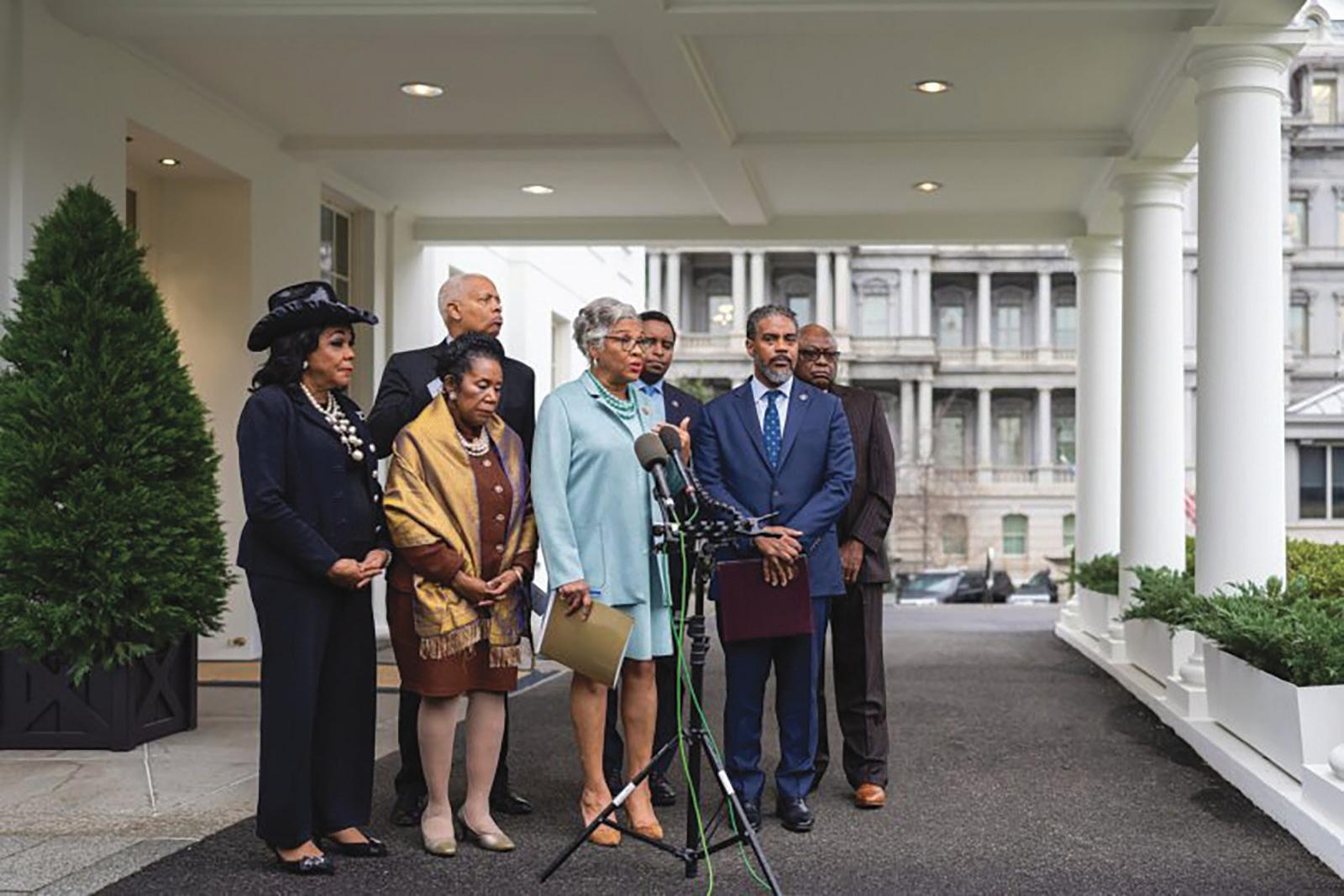 By Stacy M. Brown
By Stacy M. Brown
NNPA Newswire Senior National Correspondent
Members of the Congressional Black Caucus (CBC) firmly stated that Black Americans are being attacked in various ways nationwide, with Republicans leading these efforts.
“We refuse to be victims, and we will not be silenced,” declared CBC Chairman and Representative Steven Horsford (D-Nev.) during a State of Black America press
event held at the Capitol.
“Our fundamental rights are under siege, and our history is being denied. But we will not passively witness these actions. Too many people count on us to fight for them.”
Recent events in several GOP-led state legislatures have intensified concerns within the CBC.
Despite a Supreme Court order, Alabama and Louisiana legislatures refused to create an additional
district with a majority of Black residents.
The Florida State Board of Education has approved new education guidelines that downplay the harsh history of slavery.
Instead, they emphasize the perceived benefits gained from the skills of enslaved people.
Rep. Maxwell Frost from Florida, the youngest member of the House, expressed frustration with his state’s guidelines.
He said these guidelines aim to erase and indoctrinate this generation with white supremacy.
However, Frost warned that Florida officials should not underestimate Black America’s determination to organize and resist.
Members of the CBC said that statements made by their GOP counterparts at the Capitol have deeply disturbed them, adding to the mounting discontent.
Rep. Eli Crane from Arizona made an offensive comment during a House floor debate by referring to Black people as “colored people.”
Meanwhile, Sen. Tommy Tuberville from Alabama defended a controversial statement by denying the racism of white nationalists.
Horsford acknowledged that expectations from Republican leaders are minimal at this point, but Representative Troy Carter (D-La.) demanded that the party’s leaders take a stand against such bigotry.
“The silence from Republicans and others in the face of such egregious statements is deafening,” Carter said. “We will not condone the erasing of history. We must stand together to put an end to this.”
The CBC has issued a list of demands, calling on the Department of Justice and the Department of Education to launch investigations into education policies.
The caucus recently met with Education Secretary Miguel Cardona to discuss policies about Black history. They also sent formal letters to Cardona and Attorney General Merrick Garland, urging for a “strong legal strategy.”
“Black people did not benefit from slavery; we built this country,” emphasized Horsford.
Bakersfield Youth Jobs Program Now Accepting Applications
BAKERSFIELD –– The Kern Community Foundation announces the release of the City of Bakersfield’s 2023-2024 Youth Jobs Program City Hall Fellowship application. The City Hall Fellowship provides valuable opportunities for youth ages 18 to 30 years old.
Applications will be open from July 31, 2023, to August 18, 2023. Eligible participants must be at least 18 years old by Monday, September 18, 2023, and no older than 30 years old by Friday, August 2, 2024.
The City Hall Fellowship Program spans ten months and offers a unique opportunity for youth to work and learn alongside staff in various City departments. Fellows will engage in administrative duties and analyses, participate in budget management, prepare and present reports, and attend workshops covering personal, professional, and civic development. Fellows will work approximately 20 hours per week and be paid $23.00 per hour. In addition to hands-on experience, participants will benefit from ongoing support and career development services from the Kern Community Foundation, including mentorship, professional workshops, travel stipends, and field trips.
The application deadline is 11:59 PM on Friday, August 18, 2023. To apply and find more information, please visit the Kern Community Foundation’s official website at https://www.kernfoundation.org/ bakersfield-youth-jobs-program/ or call the Kern Community Foundation at 661-616-2610.
Members of the CBC said that statements made by their GOP counterparts at the Capitol have deeply disturbed them, adding to the mounting discontent. Rep. Eli Crane from Arizona made an offensive comment during a House floor debate by referring to Black people as “colored people.”
“Our toil, sweat, and tears went into constructing the very foundation of this nation. Elevating Black America is an elevation for all. We will not tolerate this assault on our rights.”
Education Department Launches Investigation into Harvard University’s Legacy Admissions
By Stacy M. Brown NNPA Newswire Senior National Correspondent

Following a complaint from advocacy groups that Harvard University was breaking federal law by using legacy admissions, the U.S. Department of Education has acted.
This week, the department formally notified Lawyers for Civil Rights, the organization that filed the complaint against Harvard, that it has initiated a probe into the university’s admissions process.
The Office for Civil Rights within the Education Department is investigating.
While confirming the investigation, an Education Department spokesperson refrained from providing further comments.
The complaint, a comprehensive 31-page document, was filed by the Greater Boston Latino Network and other advocacy groups.
Its central argument is that legacy admissions at Harvard place applicants of color at a significant disadvantage, contradicting the university’s purported commitment to promoting campus diversity.
According to the complaint, Harvard College grants special preferences to many predominantly white students yearly because of their familial ties to the university.
Applicants with relatives who are wealthy donors or Harvard alumni receive preferential treatment from the outset of the admissions process, receiving extra “tips” throughout.
As a result of this practice, known as “Donor and Legacy Preferences,” these students enjoy significantly higher acceptance rates than other applicants, making up as much as 15% of Harvard’s admitted students.
“The students who receive this preferential treatment – based solely on familial ties – are overwhelmingly white,” the complaint stated.
“Nearly 70% of donor-related applicants are white, and nearly 70% of legacy applicants are white. The results of this preferential treatment are substantial.”
For example, over the period 2014–2019, the complaint notes that donor-related applicants were nearly seven times more likely to be admitted than non-donorrelated applicants.
Additionally, legacy applicants were almost six times more likely to be admitted than nonlegacy applicants.
The complaint asserts that donor and legacy preferences disproportionately favor white applicants and systematically disadvantage students of color, including Black, Latinx, and Asian Americans.

“A benefit provided to some applicants but not to others necessarily advantages the former group at the expense of the latter,” the complainants wrote, quoting the U.S. Supreme Court, which struck down affirmative
action-based admissions in higher education.
The advocacy groups behind the complaint have urged the Education Department to intervene, calling on the institution to declare that Harvard must discontinue the use of legacy admissions if it intends to continue receiving federal funds.
The complaint maintains that legacy admissions lack educational justification and are awarded without considering the applicants’ credentials or merits. Instead, it solely benefits individuals born into specific families.
Legacy admissions practices at Harvard and other universities have faced increased scrutiny, particularly after a court ruling and comments from President Joe Biden.
The President stated that legacy admissions contribute to expanding privilege rather than promoting equal opportunities.
Moreover, the NAACP has joined in calling for an end to this practice, asserting that it disproportionately favors white applicants.
The complaint concludes that granting a spot to a legacy or donor-related applicant essentially denies that opportunity to another candidate who meets the admissions criteria solely based on their merit.
The advocates argue that removing legacy and donor preferences would result in more students of color being admitted to Harvard.
“This preferential treatment violates federal law,” the complaint stated. “Specifically, because Harvard receives substantial federal funds, it is bound by Title VI of the Civil Rights Act of 1964 and its implementing regulations, which forbid practices that have an unjustified disparate impact on the basis of race.”
The City Hall Fellowship is a component of the Bakersfield Youth Jobs Program. Funded by a $5.39 million grant from California Volunteers and the State of California, the program offers four tracks, including a paid high school summer internship, a paid collegelevel fellowship program, a paid recreation internship, and collaborations with nonprofit organizations to employ at-risk youth.
Man Pleads Guilty to Vehicular Homicide in Death of Black Lives Matter Protester in Seattle
SEATTLE (AP) –– A man who hit two protesters with his car, killing one of them, during a Black Lives Matter demonstration in 2020 in Seattle has pleaded guilty to multiple felonies.
Dawit Kelete, 30, pleaded guilty on Thursday to vehicular homicide in the death of 24-year-old Summer Taylor, The Seattle Times reported. He also pleaded guilty to vehicular assault and reckless driving charges. Attorneys as part of the plea deal have agreed to recommend a sentence of more than six years in prison and 18 months of probation. Kelete is set to be sentenced in September.
On July 4, 2020, the Washington State Patrol said Kelete drove the wrong way onto Interstate 5, around a barricade of parked vehicles, and struck Taylor and Diaz Love.
Taylor later died and Love was hospitalized with multiple injuries.
Francisco Duarte, Kelete’s attorney, said Kelete asked about the victims from the beginning and has shown remorse. Duarte also claimed authorities were negligent and failed to protect the public and protesters.
An attorney for Taylor’s family, Karen Koehler, on Thursday lamented the years it’s taken for the case to move through the court system, and said the family is focused on remembering Taylor, KING-TV reported.
“While it was a relief to know they wouldn’t have to go to court, there’s a lot of very sad, grieving people still,” Koehler said. “They are... resigned, that this is the best that can be done.”
Love, who suffered a traumatic brain injury, fractures, lacerations, and other physical wounds, is suing the state, city and Kelete. A trial date has been scheduled for next February.
The lawsuit says Kelete was driving negligently and that state and city agencies failed to block all access ramps to I-5 and refused to protect vulnerable protesters. The State Patrol had closed the freeway during the demonstration, which was part of a run of nightly protests over the murder of George Floyd by Minneapolis police.
Family described Taylor as someone who was dedicated to justice. She had been demonstrating and rallying in support of Black Lives Matter nearly every day of the protests.

The complaint, a comprehensive 31-page document,was filed by the
Greater Boston Latino Network and other advocacy groups.
Georgia Judge Denies Trump’s Legal Team’s Bid to Toss Evidence in Election Interference Investigation
By Stacy M. BrownNNPA Newswire Senior National Correspondent
Barricades are up around the Fulton County courthouse in Georgia, and District Attorney Fani Willis has proclaimed that she’s ready to move forward, the strongest hint yet that former President Donald Trump will face criminal charges in the Peach State.
Further, State Superior Court Judge Robert McBurney rejected Trump’s legal team’s attempts to dismiss evidence in the ongoing criminal investigation into interference during the 2020 Georgia presidential election.
The judge also denied efforts by Cathy Latham, a GOP fake elector from Georgia, to join Trump’s legal challenge.
In the nine-page order issued on Monday, July 31, McBurney stated that neither Trump nor Latham had the standing to challenge the investigation at this preindictment phase.
He emphasized that being the subject of a highly publicized criminal investigation does not justify interfering with or halting the proceedings.
Willis remains on track to formally charge Trump by September 1.
Unmoved by the twice-impeached and already twiceindicted former president, Willis reportedly is considering bringing racketeering and conspiracy charges against Trump and his allies for their attempts to overturn the 2020 election results in Georgia.
“The work is accomplished,” Willis told WXIA-TV.
“We’ve been working for two and half years. We’re ready to go.”
Trump’s legal team had sought to dismiss all evidence obtained from the special purpose grand jury investigation and disqualify Willis, citing concerns about the constitutionality of such grand juries in the state and criticizing her public comments on the case.
However, the Georgia Supreme Court dismissed Trump’s attempt to halt the investigation.
Judge McBurney explained that Trump and Latham could address their concerns about the constitutionality of the special purpose grand jury statutes and the performance
of the Special Purpose Grand Jury and its supervising judge later and in an appropriate forum.
Regarding the Trump team’s claims that Willis should be disqualified from overseeing the investigation, McBurney noted that the District Attorney’s Office had been conducting its duties impartially and professionally, in contrast to the “personal invective from the movants,” an apparent reference to Trump’s legal team.
The judge also addressed the Trump team’s request to remove him from the case, pointing out that his ruling was timely and that the effort to remove him should be rendered moot.
Willis’ investigation, which spans over two and a half years, includes allegations of solicitation of election fraud, making false statements to government bodies, conspiracy, racketeering, violation of an oath of office, and involvement in election-related threats.
Following the local sheriff’s office placing barricades around the Fulton County Courthouse, Willis praised the increased security measures.
“I think that the sheriff is doing something smart in making sure that the courthouse stays safe,” Willis told a local television station.
“I’m not willing to put any of the employees or the constituents that come to the courthouse in harm’s way.”
Willis also urged local officials to stay vigilant about potential security threats after sharing a racist and sexualized message she received, indicating the disturbing nature of some communications she and her staff have encountered during the lengthy investigation.
“I am sending to you in case you are unclear on what I and my staff have come accustomed to over the last 2 ½ years,” Willis reportedly wrote in an email to Fulton County officials.
“I guess I am sending this as a reminder that you should stay alert over the month of August and stay safe.”
“Please make decisions that keep your staff safe.”
Federal Court Blocks Mississippi Voting Law, Protecting Voter Assistance
By Stacy M. Brown NNPA Newswire Senior National Correspondent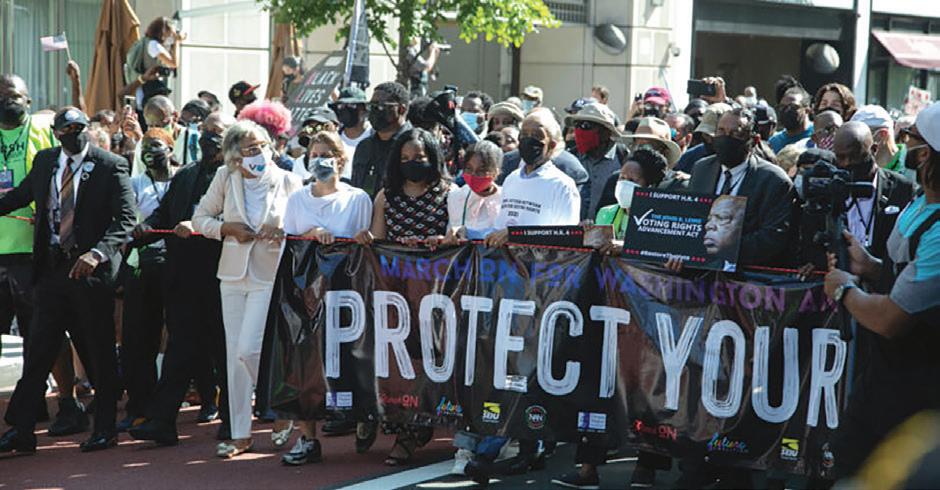
A federal court has granted a request by Disability
Rights Mississippi, the League of Women Voters of Mississippi, and three state voters to block S.B. 2358 — a newly implemented law that significantly diminishes access to the ballot for Mississippians who need assistance with voting.
Under the Court’s order, Mississippi voters who need assistance due to disability, blindness, or inability to read or write may select a person of their choice to assist them
with delivering or returning their absentee mail-in ballot.
The Court ruled S.B. 2358 violated Section 208 of the Voting Rights Act of 1965, and the state cannot use that law to punish individuals who assist such voters.
The order will apply to the current primary and the upcoming general elections in November.
“Mississippi voters in need of assistance to vote can be assured that their voices will be heard at the ballot box,” said Peg Ciraldo, co-president of the League of Women Voters of Mississippi.
“The League and its members can now continue its critical work to advocate for all voters, especially those who depend on us to return their absentee ballot.”
imprisonment of up to one year in county jail and/or a fine of up to $3,000.
But plaintiffs argued that the law is not clear in its definitions, including its definitions of who constitutes a “family member, household member, or caregiver.”
In May, the three plaintiffs sued the State with the help of Disability Rights Mississippi, the Mississippi Center For Justice, the Southern Poverty Law Center, the American Civil Liberties Union, the ACLU of Mississippi and the League of Women Voters of Mississippi.
One of the plaintiffs, William Earl Whitley, a Black disabled U.S. Army Veteran from Okolona, Miss., lost both legs in Vietnam.
voters.
“We are pleased that voters with a disability or language barrier can continue receiving assistance with their ballot, the same way that they have in past elections,” Cheung said.
“Rather than making voting harder, Mississippi should pass legislation to expand opportunities for voting so that all citizens can participate in their democracy.”
Mississippians may now continue to assist voters without the fear of prosecution, said Ahmed Soussi, SPLC’s Voting Rights Practice Group staff attorney.
Bakersfield
News Observer
Adjudicated a Newspaper of General Circulation August 11, 1980, Kern County Superior Court Decree, Case No. 16964, Government Code 6023.
Bulk Mailing Permit 724 Bakersfield, CA 93385
Published By Observer Group Newspapers of Southern California, Inc. Corporate Office 1219 20th St. Bakersfield, CA 93301 (661) 324-9466.
Member of The National Newspapers Publishers Association, Associated Press, and The Better Business Bureau
President: Ellen Coley
CEO: Jon Coley
Publisher/ Editor: James Luckey Jr.
Operations Manager: James Luckey
Credo-The Black Press believes that America can best lead the world away from racial and national antagonisms when it accounts to every person, regardless of race, color, or creed full human and legal rights. Hating no person, fearing no person, the Black Press strives to help every person in the firm belief that all are hurt as long as any one is held back.
The Observer Group Newspapers reserves the right to publish views an opinions that may not necessarily reflect those of the staff and management and are solely the product of the responsible individuals who submit commentaries published in these newspapers. Letters, articles and comments appearing in the Observer Newspapers reflect the opinions of the contributor and do not constitute the opinion or endorsement by The Observer Newspapers or its staff. The Observer Group Newspapers assumes no responsibility for photographs, articles, letters, press releases and unsolicited materials. Decisions as to the editing and publishing of materials are at the discretion of the Publisher and Editors. All rights are reserved on materials accepted for publication unless otherwise specified.
Bakersfield News Observer
The Valley’s News Observer
The Valley’s News Observer
1219 20th St. Bakersfield, Ca 93301 Mailing
Address P.O. Box 2341 Bakersfield, CA 93303
Phone (661) 324-9466 Fax (661) 324-9472
Emails and general info: observernews@gmail. com, Advertising: observeradvertising@gmail. com Available online: www.ognsc.com
Celina Stewart, the chief counsel and senior director of advocacy and litigation at the League of Women Voters, called Mississippi’s S.B. 2358 part of a trend in laws targeting voter services organizations that assist voters.
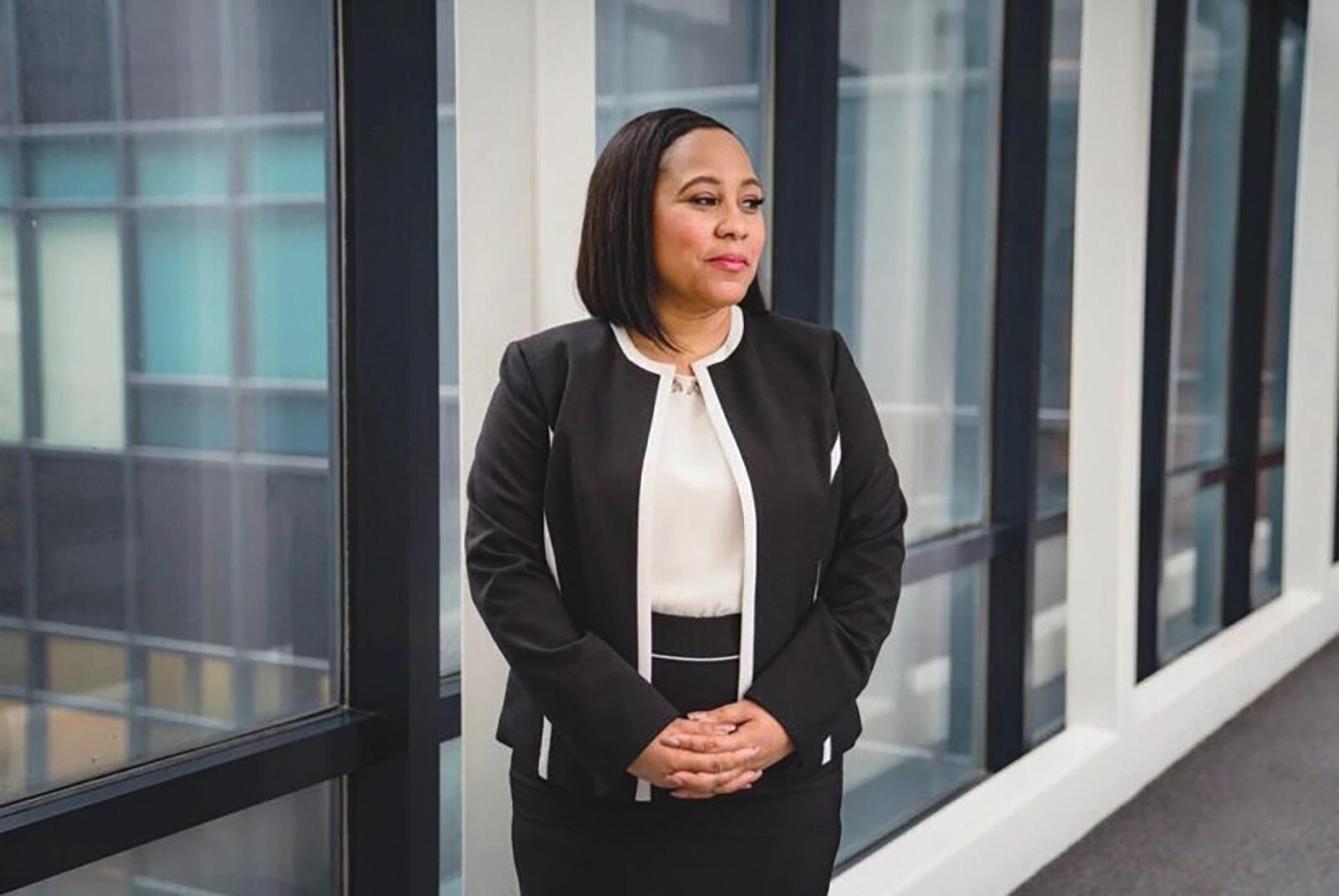
“We’re pleased that the Court here has blocked this law to protect the vital work done by organizations like the League and the voters who would be disenfranchised by preventing those organizations from assisting them,” Stewart asserted.
According to the Mississippi Free Press, The Mississippi Legislature passed and Gov. Tate Reeves signed Senate Bill 2358 into law earlier this year.
It lists five exceptions for those who can transmit ballots, including election officials engaged in official duties; employees of the U.S. Postal Service engaged in official duties; other individuals allowed by federal law to collect and transmit U.S. mail while engaged in official duties as authorized by law; a “family member, household member, or caregiver of the person to whom the ballot was mailed”; and a “common carrier that transports goods from one place to another for a fee.”
The publication noted that the law stated that anyone else who transmits ballots and violates the law “shall” be subject to a misdemeanor criminal charge that includes
The other two plaintiffs are Yvonne Gunn and Mamie Cunningham, two local community members who have long helped Whitley by collecting and mailing his ballots on his behalf.
The judge noted in his ruling that Section 208 of the Voting Rights Act of 1965 says that “any voter who requires assistance to vote by reason of blindness, disability, or inability to read or write may be given assistance by a person of the voter’s choice, other than the voter’s employer or agent of that employer or officer or agent of the voter’s union.”
“This court, however, cannot, from the language of the statute, ascertain whether the individual Plaintiffs who previously have provided assistance to eligible disabled voters for many years clearly meet that definition.”
“This court, further, has not guideposts as to which individuals may be deemed ‘family members’ or ‘household members’, the other exempted assistors,” he added.
“This statute, then, vests prosecuting authorities with broad discretion in relying upon their own definitions of these vital terms—caregiver, family members, or household members.”
Ming Cheung, the staff attorney with the ACLU’s Voting Rights Project, called the ruling a huge win for
“We are glad that the Court recognized the federal guarantee to voters with a disability or language barrier to select a person of their choice to provide them assistance. What is important now is to make sure everyone who is eligible to vote does vote in the upcoming elections,” Soussi stated.
Under the Court’s order, Mississippi voters who need assistance due to disability, blindness, or inability to read or write may select a person of their choice to assist them with delivering or returning their absentee mail-in ballot.
Federal Judge Blocks Arkansas
Law Criminalizing Library Materials for Minors
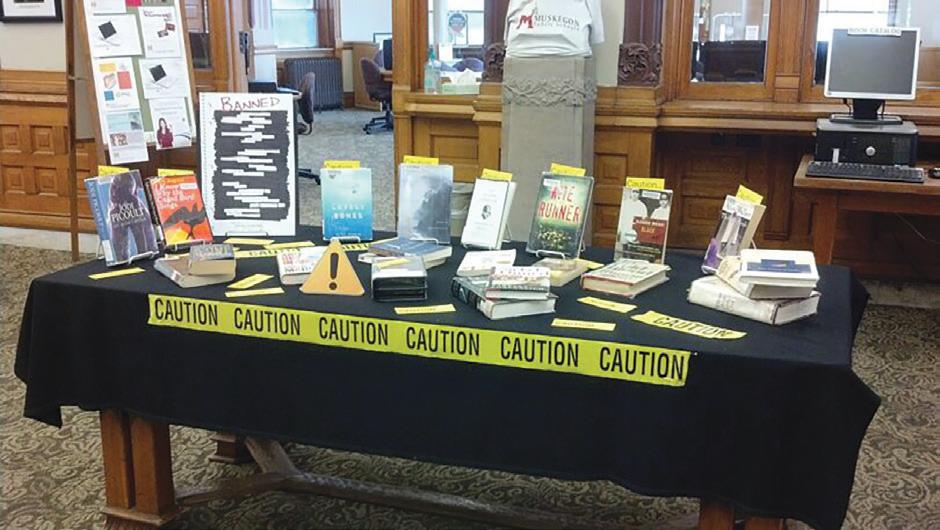 By Stacy M. Brown
By Stacy M. Brown
NNPA Newswire Senior National Correspondent
U.S. District Judge Timothy L. Brooks has issued a preliminary injunction that temporarily prevents Arkansas from enforcing a controversial law that would have authorized criminal charges against librarians and booksellers for providing “harmful” materials to minors.
On August 1, the law that Republican Governor Sarah Huckabee Sanders signed earlier this year was to take effect.
The measure also sought to introduce a new process to challenge library materials and relocate them to areas inaccessible to children.
However, the coalition, including the Central Arkansas Library System in Little Rock, raised concerns that the fear of legal prosecution might lead libraries and booksellers to
refrain from carrying challenged titles.
The American Civil Liberties Union (ACLU) of Arkansas, representing some of the plaintiffs in the case, welcomed the court’s ruling, emphasizing that the absence of a preliminary injunction could have threatened First Amendment rights.
Holly Dickson, the executive director of the ACLU in Arkansas, stated, “The question we had to ask was – do Arkansans still legally have access to reading materials?”
“Luckily, the judicial system has once again defended our highly valued liberties,” she told the Associated Press.
The issue has drawn attention to the broader trend of conservative states seeking to pass measures to ban or restrict access to certain books.
Last year, attempts to ban or restrict books across the United States reached their highest level in two decades, according to the American Library Association’s records.
Similar laws aimed at restricting access to specific materials or easing the process of challenging them have already been implemented in several other states, including Iowa, Indiana, and Texas.
The Authors Guild expressed its delight over the judge’s decision, with Cheryl Davis, the general counsel for the organization, stating that enforcing such a law could potentially infringe on the free speech rights of older minors who can comprehend more complex reading materials.
The defendants in the case include the state’s 28 local prosecutors and Crawford County in western Arkansas.
Additionally, a separate lawsuit is challenging the decision of the Crawford County Library to segregate children’s books with LGBTQ+ themes into a separate section.
The plaintiffs challenging Arkansas’ restrictions consist of the Fayetteville and Eureka Springs Carnegie public libraries, the American Booksellers Association, and the Association of American Publishers.
The situation has brought to light the growing issue of book bans in public schools, with a recent PEN America report revealing a 28 percent increase in individual book bans during the first half of the 2022-23 school year compared to the previous six months.
The report, titled “Banned in the USA: State Laws Supercharge Book Suppression in Schools,” attributes the rise in bans to censorious legislation enacted in various states, including Florida, Utah, and Missouri.
These laws have imposed stringent review policies on school libraries, reducing access to literature for students under the threat of punishment.
Since July 2021, PEN America has recorded over 4,000 banned books, affecting 2,253 unique titles, with 1,477 individual book bans impacting 874 unique titles during the first half of the 2022–23 school year.
Unlike in the past, when book bans were primarily initiated by concerned citizens, nearly a third of this year’s book bans were a direct consequence of newly enacted state laws, exacerbating the challenges to free expression and access to information in public schools.
“The heavy-handed tactics of state legislators are mandating book bans, plain and simple,” said Suzanne Nossel, Chief Executive Officer of PEN America.
“Some politicians, like Florida Governor Ron DeSantis, have tried to dismiss the rise in book bans as a ‘hoax.’ But their constituents and supporters are not fooled. The numbers don’t lie and reveal a relentless crusade to constrict children’s freedom to read.”
Janelle Monae Talks about Freedom, How New Album Defines Her and Getting Ready to Tour Again
By JONATHAN LANDRUM Jr.AP Entertainment Writer LOS ANGELES (AP) –– If you believe Janelle Monae 's hyper-sexual expression is a front, think again.
These days, Monae is unapologetically living her truth in a bold manner while trying to avoid negativity. The star, once known for sporting custom-made suits, has shed that attire (at least for now) to nearly bare all, like on the cover of her latest studio album, "The Age of Pleasure," where she's seen swimming topless in a pool. It's her first release since 2018's "Dirty Computer," which was nominated for album of the year at the Grammys.

In recent months, Monae hasn`t been afraid of risque looks and nudity. She revealed herself during an event celebrating the release of her single "Lipstick Lover" and again onstage at an Essence Music Festival set __ which
drew some social media criticism including from singer India Arie and rapper Uncle Luke. She also attended the 2023 Met Gala in a barely-there outfit.
For Monae, this is her time to be free.
Monae spoke recently with The Associated Press about her supportive mother, side- stepping criticism and teasing her upcoming North American tour, which kicks off Aug. 30 in Seattle. Other tour stops include New York and Nashville and she`ll wrap in Los Angeles in mid-October.

AP: Since you haven't toured since 2019, was your recent Essence Festival performance a tune up for your upcoming tour?
MONAE: Yeah, we're testing out the songs. You're getting them in your body. Right now, we don't have a lot of muscle memory with the new songs. We haven't toured them. I know if you come into the show, you`ll love the songs. But hearing them live is a different experience, especially when you're putting them with songs from previous work. We're basically just putting a show together based on what we feel is good. Sometimes you just don't know until you get on stage.
AP: What do you want people to take away from your show?
MONAE: Tap into your free (expletive) energy. That's rooted in self-love __ not arrogance. Tap into that space and then take care of each other. That's what I hope. With the shows that I do, and when I look out, it's an experience. It's like our own church. You want to take care of each other.
Even if your freedom doesn't look like that person's freedom, you understand that we're fighting against something much bigger than us. We're systemically fighting against something much bigger than us, so we got to band together, we got to stick together. We have to make sure that we're showing up for each other. If we have privilege in certain areas, making sure that we're lending a hand, lending a voice, amplifying a message.
AP: How has it been to walk in your truth while facing criticism about your racy performances from people like Arie and Uncle Luke?
MONAE: That has absolutely nothing to do with me. I love everybody. I'm in the age of pleasure.
AP: When did you feel comfortable with living life the way you want without caring about others' opinions?
The 43-year-old actress and comedian revealed she recently experienced her eighth miscarriage.
Tiffany Haddish Opens Up About Her Personal Fertility Journey
By Stacy M. BrownNNPA Newswire Senior National Correspondent
Actress Tiffany Haddish has shared her emotional fertility journey, shedding light on her challenges and the continued challenges Black women have with childbirth.
The 43-year-old actress and comedian revealed she recently experienced her eighth miscarriage.
“Well, I’m going to be honest with you, this would be my eighth [miscarriage],” Haddish bravely told the Washington Post.
“I’ve got a uterus shaped like a heart. It just won’t keep anything in.”
Haddish is widely recognized for her comedic brilliance and has made a significant mark as an actress and producer.
One of her breakout roles was in the immensely popular comedy “Girls Trip,” where she stole hearts with her portrayal of “Dina” alongside Jada Pinkett Smith, Queen Latifah, and Regina Hall.
Her impressive filmography also includes notable works like “The Last OG,” “Night School,” “The Carmichael Show,” “Keanu,” and her hosting gig at the 2018 MTV Movie and TV Awards.
She became the first Black female stand-up comedian to host “Saturday Night Live” in November 2017.
Unfortunately, Haddish’s experience is not unique, as many Black women in the United States regularly face miscarriages and complicated pregnancies.
Statistics show that about 20% of pregnancies end in
miscarriage, with Black women being 43% more likely to experience pregnancy loss than white women.
On Rachel Bilson’s “Broad Ideas” podcast, Haddish revealed that her struggles with endometriosis and misdiagnosis also played a role in her multiple miscarriages.
Experts said the impact of miscarriages extends beyond the physical aspect and can trigger a complex grieving process that affects women’s mental health.
Haddish had previously chosen to keep her pregnancy losses private, sharing the experience only with one close friend.
“I didn’t want people saying: ‘Are you OK? Are you alright?’ Like a wounded animal, I just rather go in a cave by myself. Lick my wounds,” she stated.
Haddish also acknowledged how painful and emotionally challenging those losses have been, describing them as shattering pieces of her soul.
Haddish said she remains open to motherhood, despite life’s ups and downs, including a divorce in 2013 and a public breakup with former boyfriend Common in 2021.

She has contemplated adoption and taken parenting classes in preparation for the possibility of welcoming a child into her life.
“I’m looking at, you know, [age] five and up — really like seven,” Haddish said, emphasizing her desire to let any child she may bring into her life know they are loved and cherished.
MONAE: It's not like I don't care what people think. I care what some people think. I don't care what everybody thinks. That's the same when it comes to music. When you make a new song, I can't go soliciting everybody's opinions about the song. By the time I get back to the second pass of it, it's all over the place. Everybody's going to have an opinion. For me, it's like, whose voice do I trust? Who do I know that loves me, cares about me, whose taste do I like, who actually is evolved enough to even understand what it is that I'm doing? Who understands nuance?
You shouldn't care what anybody has to say. You just care what the right people have to say and everything else is muted.
AP: Who are those right people for you?
MONAE: Family. Close friends.
AP: In your journey, your mother has been a huge supporter. Whenever you have fallen under certain criticisms, how has she helped you navigate the critics?
MONAE: My mom is like ride or die. I have to tell her like "Mom, you don't need to defend me. You don't need to defend my life or my decisions." For her, I'm her baby. Like any mama bear, you might get punched in the eye if you say something. You might. But I've calmed her down over the years. For the most part, we mostly respond to love. It's a lot of people that love where I am and who I am and what I'm doing, and they feel really empowered and inspired by it, and that makes my mom proud, and it makes me happy.
AP: How do you avoid the naysayers?
MONAE: I'm too busy living life to be distracted. The positive things are always amazing too, but I also don't go fishing for that. One of the things about being in the age of pleasure is being present and making sure that I'm dipping in on social media, saying what I need to say, showing love, saying "thank you," putting up my art and leaving, going to go create more things and make more memories and more experiences.
I'm in the middle of putting together a tour for North America. We haven't been on tour since 2019. For me, I have a lot of things that keep me busy. I'm practicing guitar. I'm having the best sex of my life. I'm happy. Even in the middle of all that's going on in this world, I'm finding time to steal joy and to center joy and to stay surrounded by the people that bring me joy and that I can bring joy too.
AP: How did "Age of Pleasure" define where you are in life?
MONAE: I wanted to create a soundtrack to our lifestyle. I think this album like all my albums reflect exactly where I am at that time. Each album will let you know where I was in my evolution process, what things I had to unlearn, what things I learned. I love that. I love that you can always look at an artist working, sort of see what they were on at that time.
Gender Pay Gap Is “More Obvious” With Black Women

Jaya Padmanabhan
California Black Media California First Partner Jennifer Siebel Newsom says, “gender discrimination is the oldest form of oppression,” and America must act urgently to fix it.
Although California has some of the strongest pay laws in the nation and the smallest gender pay gap, Siebel Newsom says the Golden State still has work to do to close the wage gap for all women.
For Black women, the first partner says, closing the wage gap is “most obvious.”
“Black women live at the intersection of racial and gender discrimination leaving them doubly impacted by the wage gap,” said Siebel Newsom. “Pay inequities and gaps in wealth and economic opportunity are deeply rooted in our country’s long-standing history of racism and misogyny.
To mark Black Women’s Equal Pay Day Siebel Newsom released a video on July 27 along with Los Angeles County Supervisor Holly J. Mitchell, Los Angeles Mayor Karen Bass, and PolicyLink Founder in Residence, Angela Glover Blackwell.
“Today is Black Women’s Equal Pay Day – a day set aside each year to shine a light on the disparity in pay for Black women in this country and the far-reaching impacts for families, communities, and our economy,” said Bass in
the video.
“Economic injustice is a problem across the board, and to solve problems effectively and authentically, we have to focus on those most impacted. Together, we will work to close this gap,” the mayor of California’s largest city continued. On average, women earn 84 cents for every dollar a non-Hispanic White man does. That breaks down to Black women earning 67 cents; Latinas and Native Americans 57 cents; mothers 74 cents; LGBTQIA women 87 cents and women in leadership positions 72 cents for every dollar a non-Hispanic White man earns. Women are hired into lower paying roles at lower starting salaries and take longer to move into leadership roles.
Black women are overrepresented in industries that experience significant downturns. A report by the Department of Labor found that in 2020, 12% of Black women were employed in education and health services but a disproportionate number of them (14.9%) experienced job losses. Also, in wholesale and trade, the majority of losses were Black women. In that sector, Black women comprised 5.6% of the workforce but 14.6 % of the job losses
According to the report, Black women lost out on $39.3 billion in potential wages due to differences in industry and occupations relative to White men.
Racism and sexism are two of the obstacles that Black women face in the workplace. More than half of Black women surveyed for a 2021 National Women Law Center reported facing gender and racial hurdles to opportunity at work.
In 2019, Siebel Newsom launched the California for ALL Women, an initiative to address gender equity at the state level. Through the initiative, she has been an outspoken champion and thought leader on pay equity, working to close the race and gender wage gaps.
That same year, Siebel Newsom announced the California Equal Pay Pledge under California for all Women to build upon California policies such as the Fair Pay Act
In 2022, Gov. Gavin Newsom signed into law the Pay Transparency for Pay Equity Act, introduced by Senator Monique Limón (D-Santa Barbara). This law requires employers to disclose salary ranges on all job postings and to allow public access to pay data broken down by race, ethnicity and sex for direct employees and those hired through third-party staffing agencies.
“As there is more transparency in the hiring and promotion process there will be outcome in closing the pay gap across companies,” said Siebel Newsom.
Mitchell says she is proud to stand with the first partner and other women and allies around California and the
United States to end racial and gender pay discrimination.
“Intentional and bold action on closing the wage gap among Black women and women of color is needed across every sector and will put us on a path to truly ensuring all women, their families and communities are no longer shortchanged from economic prosperity,” said Mitchell.
Recently, Siebel Newsom convened and moderated a panel on pay equity at Genentech in South San Francisco.
Genentech was an early signatory of the Equal Pay Pledge. The panel included Genentech CEO Alexander Hardy, Interim Chief Diversity Officer Cari DeLoa, and representatives from other parts of the business.
In addition to Genentech, there are 130 other companies and municipalities in California that have signed the Equal Pay Pledge. While acknowledging that this is not a significant number, Siebel Newsom said that there are several major global companies, like Apple, Intel, Twitter, Airbnb, Salesforce and Gap, that “are committing to equity and fairness in their policies.”
“Closing the pay gap for Black women is an essential step for economic justice,” said Glover Blackwell. “When Black women and other women of color are paid equally, we’ll see the benefits cascade throughout society.”
Jaya Padmanabhan is a freelance journalist and a consulting editor for Ethnic Media Services.
Now and Later® and La La Anthony Team
Up to Spotlight Self-Care Companies for National Black Business Month
The candy brand launches ‘Pause Now, Hustle Later’ awarding a total of $50,000 in grants to five emerging Black-owned self-care brands Chicago, IL, July 24, 2023 – Now and Later® candy with its bold flavors, hard-to-soft chew, and long-lasting eating experience recognizes that with the hustle of the daily grind, there is a benefit in taking a much-needed pause for self-care. In continued support of go-getters and changemakers in the Black community, the brand is launching ‘Pause Now, Hustle Later’ in partnership with media personality, entrepreneur, and candy lover La La Anthony, to spotlight five emerging black-owned businesses in the self-care space and to encourage fans to take a pause NOW, so that they can reset and reenergize for their daily hustle LATER.
Kicking off today in honor of International Self-Care Day, Now and Later and La La are encouraging everyone to take a pause in their day for a moment of self-care. To help fans celebrate, La La has unveiled a hand-picked list of Black-owned self-care businesses with products and services that can be added to any self-care routine.
Leading into National Black Business month in August, Now and Later is also committing $50,000 in financial support to the selected small businesses through the ‘Pause Now, Hustle Later’ Grant. Each business will receive $10,000 that will help fuel their hustle and aid in their continued growth.

“As a mom and businesswoman, the hustle is a part of my daily grind. I’m always on the go but at the same time, I have to pause and prioritize self-care so that I can show up as my best self,” said La La Anthony. “One of my favorite ways to unwind is to enjoy a sweet treat like Now and Later, and now I get to encourage others to take a pause while also shouting out some of my favorite go-to Black-owned companies.”

La La’s selected self-care brands include:
Buttah Skin, is a line of highly effective products for both women and men, formulated to target everyday skin conditions leaving skin glowing, healthy, and renewed.
Fancy Homebody, celebrates the idea of embracing a low-key lifestyle, inspiring women to achieve their own version of luxury. The lifestyle brand offers a wide variety of loungewear and other casual essentials that are as chic as they are comfy.
I See You Wellness, is a Brooklyn-based wellness
and lifestyle brand that exists to empower communities of color through accessible wellness and radical selfcare, specializing in handmade apothecary products and community healing experiences.
Natural Radiant Life, is a clean, organic and vegan brand that harnesses the power of 100% whole-food ingredients to replace toxic chemicals in skin care and slow down the visible signs of aging.
Kimberly New York, is a niche fragrance house featuring artsy, long-lasting scents safe for sensitive skin.
“Now and Later is dedicated to supporting Black leaders and entrepreneurs who are making a positive impact in their communities, which is why we launched the ‘Pause Now, Hustle Later’ Grant during Black Business Month,” said Dave Foldes, Director of Marketing at Now and Later. “According to the Small Business Association, 50 percent of small businesses fail within the first five years due to lack of financial resources. In recognition of the hustle of entrepreneurship, we’re proud to help amplify these small businesses, and to partner with an advocate like La La who not only shares Now and Later’s Brooklyn-born origins, but also embodies the brand’s bold and vibrant spirit.”
‘‘Pause Now, Hustle Later’ is the latest way that Now and Later is staying true to its commitment to celebrate and amplify Black voices through its #RecognizetheChew program. Through this program, the brand aims to encourage the next generation of changemakers who Champion, Hustle, Empower and Win (C.H.E.W.) in their daily pursuit to make their communities better. Previously the brand has teamed up with Historically Black Colleges and Universities (HBCUs), to celebrate and recognize Black community leaders and entrepreneurs. In 2021, the #RecognizeTheChew program donated financial grants to both the Mass Media Arts department at Clark Atlanta University and the Cathy Hughes Schools of Communications at Howard University.
Fans can visit @nowandlatercandy on Instagram to find all of the ‘Pause Now, Hustle Later’ grant recipients, take a glimpse into La La’s self-care routine and learn how she takes advantage of ‘the pause’ to help fuel her hustle. For more info about Now and Later candy, visit us at NowandLater.com.
Smarter Policy Can End Poverty
Lila Brown
California Black Media
A group of progressive California lawmakers –including three members of the California Legislative Black Caucus (CLBC) -- have pledged to end poverty in California by advancing more effective policy during the next legislative session – and beyond.
Newly appointed Assembly Majority Leader Isaac Bryan (D-Los Angeles) announced the formation of the End Poverty in California Caucus last month at a Los Angeles screening of the documentary “Poverty and Power.” The film features former Stockton Mayor Michael Tubbs, an anti-poverty advocate who founded a non-profit that shares a name with the caucus, End Poverty in California (EPIC).
“We’re headed towards the end of the legislative session, but we’re in the process of recruiting members to the poverty caucus,” Bryan, who is the chair of the new caucus, told California Black Media.
“We’ve got about a half dozen members already,” Bryan continued. “As we continue to do outreach in the legislature, I expect that number to grow. By the time we come back together in January to introduce new legislation we should have everything ready to go, to focusing on criminal justice reform and the housing crisis’ systemic nexus to poverty in the state.”
Bryan is the treasurer of the CLBC.
The End Poverty Caucus says it will aim to “help lawmakers organize around key votes and issues and build power in order to advance bold policy change.”
Other CLBC lawmakers who are members of the newly formed poverty caucus are Sen. Lola SmallwoodCuevas (D-Ladera Heights) and Assemblymember Mia Bonta (D-Alameda).
“Part of the reason over a quarter of our state’s residents live at or below the poverty level is because of California’s failed public policies,” said Smallwood-Cuevas in a statement. “Our State Legislature must fight for California’s working families by creating equitable access to quality jobs and doubling down on what Californians earn across the board, particularly for residents from marginalized communities of color.”
Bonta said bills she introduced this year have prioritized the needs of children and families, but she looks forward to working with her colleagues to take bolder and broader action to address those problems.
It’s clear that we need to advance stronger policies that will coordinate effective, place-based delivery of wraparound services for people most in need to make significant progress in the fight against poverty,” Bonta said. “I look forward to joining forces with our End Poverty Caucus to ensure that we strengthen our safety net and tackle the racial and economic inequities in our communities.”
Other members of the Caucus are Senators Nancy Skinner (D-Oakland) and Scott Wiener (D-San Francisco) and Assemblymembers Rebecca Bauer-Kahan (D-Orinda), Matt Haney (D-San Francisco), Ash Kalra (D-Fresno), Buffy Wicks (D-Oakland) and Luz Rivas (D-Arleta).
Some critics have cautioned, however, that creating a caucus focused on poverty is political showmanship by Democrats that will have little impact on actual poverty reduction.
Tim Anaya, vice president of the conservative leaning Pacific Research Institute, says “The new End Poverty in California legislative caucus is not going to foster a serious discussion about helping Californians climb the economic ladder. Rather, EPIC promotes policies that don’t work and would trap more Californians perpetually in poverty.”
Instead, Anaya proposes, lawmakers should support free market reform to support entrepreneurship and small business growth.
In an op-ed titled “Ending poverty in California Requires Good Policy, Not Platitudes,” that several California news outlets published last week, the author, Steven Greenhut, Western Region Director for the R Street Institute, compared the California Legislature to a high school student council setting unrealistic goals they cannot achieve.
“Ending poverty is a large promise – and the Legislature is much better at passing laws that exacerbate poverty (minimum wage, anti-competitive union work rules, onerous licensing requirements) rather than reduce it,” Greenhut writes.
Although poverty, overall, in California has decreased over the last four years, the numbers are still dire. About 28
% of state residents (4.5 million people) are poor or nearpoor, according to the Public Policy Institute of California. The state’s homeless and housing affordability crises also compound problems poor and low-income families face in the state, according to policymakers.
Bryan says he looks forward to working with leaders
like Tubbs, who has been a leading proponent of progressive economic policies like Guaranteed Basic Income and Baby Bonds.
“The best policy solutions come from listening to the people who are the most affected. I am proud to lead a caucus that is dedicated to doing exactly that,” said Bryan.
National Urban League Unveils Empowerment 2.0 in Fight for Justice and Democracy
By Stacy M. Brown NNPANewswire Senior National Correspondent
In an address to the National Urban League Conference, Marc H. Morial, President and CEO of the civil rights organization, introduced what he called the next phase of advocacy and activism: Empowerment 2.0.
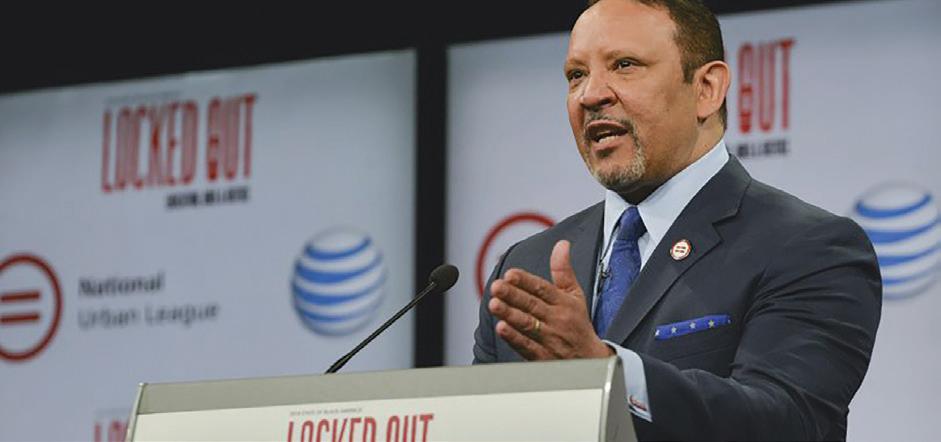
The new initiative builds on the framework of the fivepart Empowerment Agenda, which Morial first revealed in his inaugural State of the Urban League speech two decades ago.
Empowerment 2.0 focuses on the organization’s core pillars: Employment, Education, Housing, Healthcare, and Justice.
However, it also encompasses what Morial called The Three Ds: Defend Democracy, Demand Diversity, Equity,
and Inclusion, and Defeat Poverty.
Morial emphasized the critical importance of this new phase, stating that the nation is facing challenges to the hard-fought progress made since the Brown decision.
He expressed concern over assaults on justice in the Supreme Court and within state legislatures influenced by right-wing ideologies.
Morial took a firm stand against the policies of Texas Gov. Greg Abbott, criticizing them for promoting voter suppression, gerrymandering, censorship of history, and restrictive reproductive rights measures. He underscored the need for advocacy and activism in the face of such regressive policies. Reflecting on his 20-year leadership of the National Urban League, Morial highlighted the organization’s
transformation from an iconic 20th-century civil rights movement to one fit for the challenges of the 21st century.
He pointed out the shift from confronting Jim Crow to combating a new adversary, “James Crow, Esquire,” who employed subtler tactics to undermine progress.
Morial noted a new threat had emerged: “Jimmy Crow,” the son and grandson of the previous adversaries.
“Jimmy’s not content with suppressing Black votes; he wants the power to ignore election results altogether,”
Morial asserted.
“He fiercely guards the symbols of white supremacy his grandfather erected on town squares and courthouse grounds to intimidate Black Americans. He rants about ‘replacement theory’ and ‘Critical Race Theory.’”
The new initiative builds on the framework of the five-part Empowerment Agenda, which Morial first revealed in his inaugural State of the Urban League speech two decades ago.
Concerns Mount Among Democrats as Black Voter Turnout Drops, Impacting Biden’s Reelection Bid
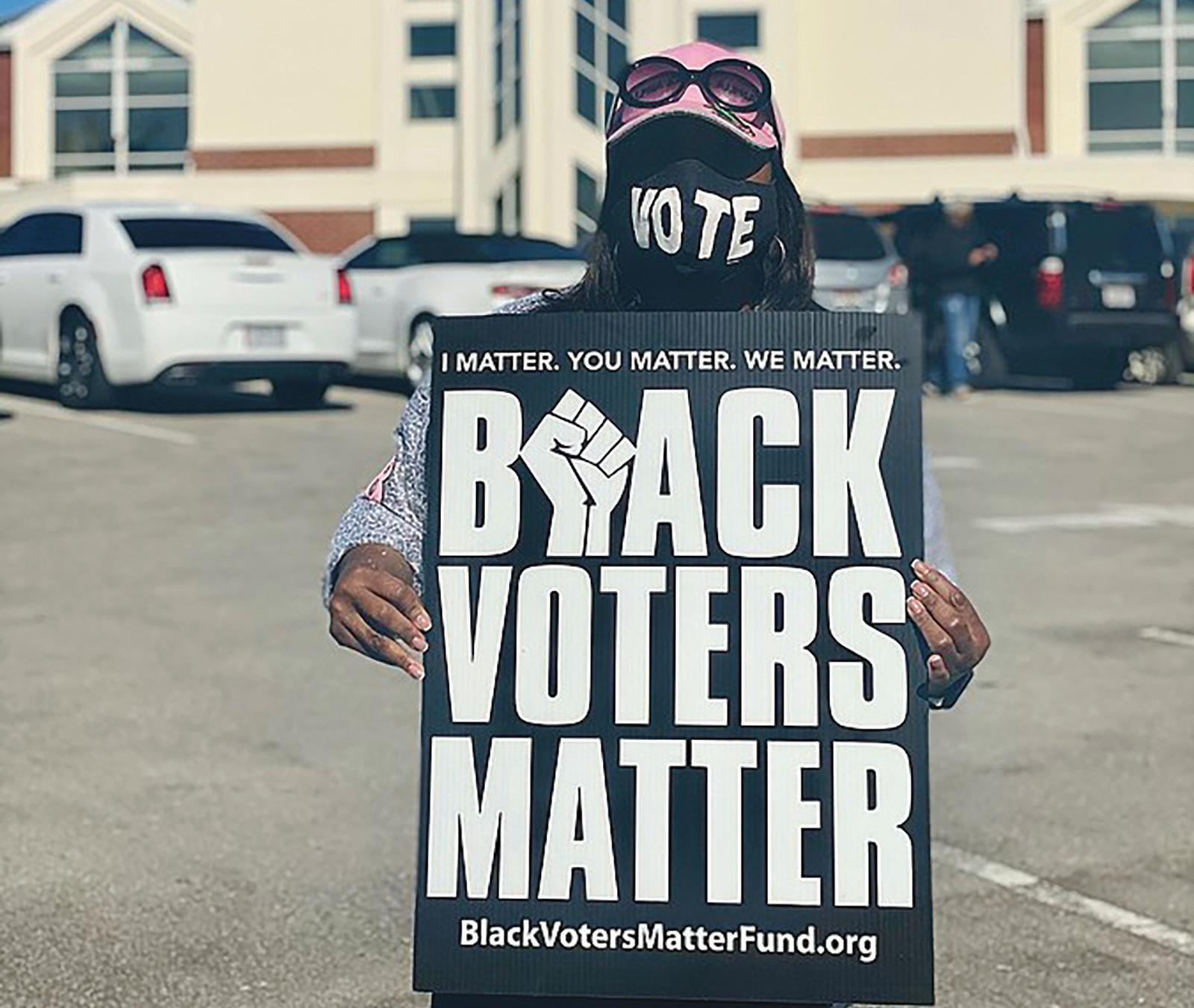 By Stacy M. Brown
NNPA Newswire Senior National Correspondent
By Stacy M. Brown
NNPA Newswire Senior National Correspondent
Democrats are increasingly worried about a potential drop in Black voter turnout next year, particularly among Black men, their most loyal constituency, who played a pivotal role in securing President Biden’s victory in 2020 and are crucial to his bid for reelection. The Washington Post analyzed the Census Bureau’s turnout survey and found that Black voter turnout saw a significant ten percentagepoint decline in last year’s midterms compared to 2018, a more substantial drop than among any other racial or ethnic group. While Democrats initially downplayed these warning signals due to other victories in 2022, such as gaining a U.S. Senate seat in Pennsylvania and Senator Raphael G. Warnock’s reelection in Georgia, the decline in Black turnout has become a significant concern for the party as they look ahead to the next presidential contest in 2024. States like Georgia, which are crucial to Democrats’ strategy for mobilizing Black voters in significant numbers, saw lower turnout among younger and male Black voters in the midterms, according to internal party analysis. W. Mondale Robinson, the founder of the Black Male Voter Project, highlighted the urgent turnout problem among Black men, telling the Post that many are “sporadic or nonvoters” registered but haven’t voted in recent presidential elections. He expressed disappointment that the Democratic Party seems more focused on converting conservativeleaning white women in the suburbs, considering Black men as potential swing voters who need targeted efforts to be mobilized. In response to the growing concern, Biden’s political team acknowledged the issue and pledged to act, especially among younger Black men. Cedric L. Richmond, a former Biden adviser now serving as a senior adviser at the Democratic National Committee, emphasized to the Post’s researchers the need to connect with Black voters, highlighting the benefits they have received from Biden administration policies. The party aims to learn from past shortcomings and draw explicit connections between its policies and the well-being of Black communities. The
challenge is particularly acute among Black men who often feel alienated from the political process due to historical policies that increased incarceration and job losses in manufacturing sectors. Many express disillusionment after experiencing upheaval from a global pandemic and witnessing escalating violence in urban areas. To win their support, Democrats must focus on highlighting specific policy benefits rather than solely concentrating on criticism of former President Trump and Republican extremism, the analysts found. Despite Black women historically showing more robust voting enthusiasm, concerns over Black voter turnout also extend to this group. Biden’s reelection garnered a tepid reaction in a Washington Post/Ipsos poll of Black Americans, with only 17 percent expressing enthusiasm about another term. The poll also revealed that most Black Americans wouldn’t consider voting for Trump, but a significant portion is not enthusiastic about Biden’s reelection. Terrance Woodbury, chief executive of HIT Strategies, a polling firm focused on young, non-white voters, warned liberal groups of the urgency to convince Black voters that they have benefited from Biden’s time in office. The messaging needs to shift from attacking Trump to emphasizing policy benefits and addressing the belief among Black Americans that their votes don’t matter—a significant barrier to voter participation. Brittany Smith, executive director of the Philadelphia-based Black Leadership PAC, which mobilizes Black voters, said she has noticed a shift in how Black people respond to getout-the-vote efforts. Also, as much as Biden has praised Black voters and the Black Press, the campaign has done little thus far to utilize Black-owned newspapers and media companies to help reach African Americans. “Everybody knows that there’s no path, whether it’s President Biden or any other Democrat, federal or state, there’s no path to win that does not involve massive turnout from Black voters,” Cliff Albright, co-founder and executive director of Black Votes Matter, told the Post. “But they can’t just think that it’s just going to happen on its own. They’ve got to invest in making that happen.”
Texas Police Mistakenly Hold Black Family at Gunpoint in Traffic Stop Mishap
By Stacy M. Brown NNPA Newswire Senior National CorrespondentPolice officers in
Frisco,Texas, mistakenly held a Black family at gunpoint after a typo led them to believe their car was stolen. The disturbing incident, which took place on July 23, was captured on multiple officers’ body cameras, and has sparked outrage and concern over racial profiling and police procedures. The emotional footage showed members of the Frisco Police Department demanding the family exit their car. The family, a husband, wife, son, and nephew, identified themselves, while the boys were identified as 12 and 13 years old. One officer even pointed his gun at one of the children, eventually handcuffing him. At one point during the ordeal, the officer who ran the incorrect plates admitted her mistake. “It looks like I made a mistake. So I ran it ‘AZ’ for Arizona instead of ‘AR,’ and that’s what happened,” she said, according to the footage. The gravity of the situation hit the husband during the encounter, and he expressed his emotions, saying, “It could’ve gone all wrong for us, though. If I would’ve gone to reach for my phone, we could’ve all gotten killed,” before walking away in tears. Frisco Police Chief David Shilson issued a statement in which the department admitted its error and vowed to accept responsibility. “We will not hide from our mistakes. Instead, we will learn from them,” Shilson insisted. Frisco is a city about 30 minutes north of Dallas. The officer who ran the incorrect plates also admitted

her error. Body camera footage captured the conversation between the officer and the father as they attempted to explain the situation. The officer told the man, “I ran your tag, and it came back to, associated essentially with no vehicle. So I confirmed it with my dispatch – I’m like, ‘That’s weird.’” Soon after, the footage appeared to feature another police officer saying in the background, “She ran it out of the wrong state.” The officer who made the typo said, “AR, AR is Arkansas, correct?” Another officer responded, “It’s Arizona, though. It’s not Arizona.” “Oh, I see what you’re saying,” the officer responded. “That’s on me.” As the father and boy got out of the car, the footage showed an officer explaining the mistake to the young boy, who was crying in the back of the car, saying, “We’re so sorry you had to go through that.” The video ended with the officer, who made the error, shaking hands with the husband after he calmed down. The husband told the officer, “It’s all good.” The department promised a thorough review of the incident and committed to implementing necessary training, policies, and procedures changes to prevent similar occurrences. Shilson apologized on behalf of the department and emphasized a dedication to holding themselves accountable and ensuring transparency throughout the investigation process. The incident has again brought concerns about racial profiling and the use of force by law enforcement agencies.
U.S. DOJ Launches Civil Rights ‘Pattern or Practice’ Investigation into Memphis Police Department
 By Stacy M. Brown
By Stacy M. Brown
NNPA Newswire Senior National Correspondent Assistant U.S. Attorney General Kristen Clarke of the Justice Department’s Civil Rights Division and U.S. Attorney Kevin G. Ritz for the Western District of Tennessee have launched an investigation to determine a pattern of civil rights violations allegedly committed by the Memphis Police Department. The investigation comes in the wake of the fatal police beating of Tyree Nichols, the 29-year-old Black man who police beat, tasered, and pepper-sprayed during a traffic stop earlier this year. Nichols died three days later, sparking a civil rights probe. Clarke and Ritz said authorities are looking into conduct within the police force that might violate the Constitution or federal civil rights statutes. “The tragic death of Tyre Nichols created enormous pain in the Memphis community and across the country,” U.S. Attorney General Merrick B. Garland stated. “The Justice Department is launching this investigation to examine serious allegations that the City of Memphis and the Memphis Police Department engage in a pattern or practice of unconstitutional conduct and discriminatory policing based on race, including a dangerously aggressive approach to traffic enforcement. “We are committed to working cooperatively with local officials, police, and community members to conduct the thorough and comprehensive review that the residents of Memphis deserve.” Clarke emphasized that the Nichols case did not solely prompt the investigation. Instead, she claimed that numerous reports of officers allegedly escalating encounters with community members and using excessive force sparked it. “There are also indications that officers may use force punitively when faced with behavior they perceive to be insolent,” Clarke stated. The DOJ had previously agreed to review the Memphis Police Department’s specialized units at the request of Memphis Mayor Jim Strickland and Memphis Police Chief Cerelyn “C.J.” Davis. Clarke highlighted a concerning disparity, noting that despite Memphis being a majority Black city, the police department’s
traffic enforcement disproportionately targeted the Black community. She noted that officers were accused of using force against individuals already restrained or in custody, often resulting in serious physical injuries. The scope of the new investigation will encompass the department’s overall conduct, Clarke insisted. The DOJ will determine whether the police department engaged in unlawful stops, excessive force, and racially discriminatory policing practices against the city’s Black residents. Nichols’ family has filed a $550 million lawsuit against the city of Memphis, Police Chief Davis, the five officers involved in Nichols’ death, two additional officers, and three Memphis Fire Department employees. The lawsuit accuses the city of negligence in hiring Chief Davis and blames her for lax hiring processes. It also addresses the development of the SCORPION Unit’s “oppression style of policing” and inadequate training. The five officers facing criminal prosecution for Nichols’ death were members of the SCORPION Unit and have pleaded not guilty to murder and other charges. “I know this community is still hurting after the tragic death of Tyre Nichols,” Associate Attorney General Vanita Gupta remarked. “At the Justice Department, we are committed to using all our tools to help ensure that Memphis residents have a safe community and can trust in the actions of law enforcement,” Gupta continued. Clarke added that every person is entitled to constitutional and non-discriminatory policing. “Based on an extensive review of publicly available information and information provided to us, there are grounds to open this investigation now,” Clarke said. “We have reviewed information that indicates that the Memphis Police Department may be using an approach to street enforcement that can result in violations of federal law, including racially discriminatory stops of Black people for minor violations. “The Justice Department will conduct a thorough and objective investigation into allegations of unlawful discrimination and Fourth Amendment violations. Unlawful policing undermines community trust, which is essential to public safety.”
Historically Black Collegiate Fraternity Relocates Convention

Due to Florida’s “Harmful, Racist, and Insensitive” Policies
By Stacy M. Brown NNPA Newswire Senior National Correspondent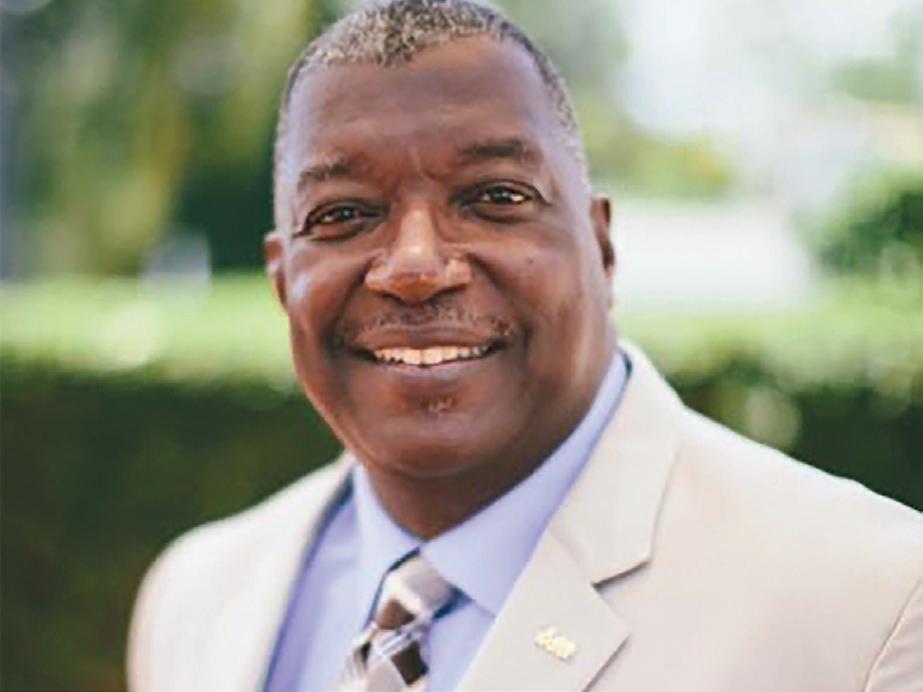
The oldest historically Black collegiate fraternity in the United States, Alpha Phi Alpha Fraternity, has announced that it will move its planned 2025 convention from Florida to an alternate location. The decision comes as a response to what the fraternity describes as “harmful, racist, and insensitive” policies implemented by Gov. Ron DeSantis’ administration towards African Americans. The convention, which typically draws between 4,000 and 6,000 attendees and reportedly has an economic impact of $4.6 million, has been a significant event for the fraternity. However, the recent travel advisory for Florida issued by the NAACP and other civil rights organizations has raised concerns about the state’s stance towards African Americans, people of color, and the LGBTQ+ community. In a statement, Willis Lonzer, the fraternity’s general president, said that part of their motivation for relocating the convention is Florida’s new education standards. The new standards mandate that middle school teachers instruct students on the idea that enslaved people developed skills for their benefit. The fraternity strongly disagrees, viewing it as an attempt to downplay the horrors of slavery and its enduring impact on African Americans. “Although we are moving our convention from Florida, Alpha Phi Alpha will continue to support the strong advocacy of Alpha Brothers and other advocates fighting against the continued assault on our communities in Florida by Governor Ron DeSantis,”
Lonzer explained. DeSantis, vying for the 2024 GOP presidential nomination, has faced criticism from various quarters, including a fellow Republican, U.S. Senator Tim Scott of South Carolina, the sole Black Republican in the Senate. In response, DeSantis defended Florida, stating that he was countering “false accusations and lies” and pledging to uphold the truth. In May, the NAACP, along with the League of United Latin American Citizens (LULAC) and Equality Florida, issued travel advisories for Florida, pointing to the state’s recent laws and policies that they deemed hostile to marginalized communities. Among these laws were restrictions on diversity, equity, and inclusion programs in state colleges, bans on critical race theory, and implementing the Stop WOKE Act, which limited specific race-based conversations and analysis in schools and businesses. Concerns were also raised over laws impacting immigrants in Florida and restricting discussions on LGBTQ topics in schools. At least nine other organizations or associations have canceled their conventions in Orlando and Fort Lauderdale, two of Florida’s major convention cities, citing concerns over the state’s political climate. Florida remains a popular tourist destination, and tourism is a vital industry for the state, providing 1.6 million full-time and part-time jobs. Despite facing challenges during the pandemic, Florida’s tourism sector bounced back, with over 137.5 million visitors in the last year, contributing $98.8 billion to the state’s economy in 2019.
The decision comes as a response to what the fraternity describes as “harmful, racist, and insensitive” policies implemented by Gov. Ron DeSantis’ administration towards African Americans.
More Should Know About Lifesaving COVID Meds
Doug Moore California Black Media
While I would like nothing more than to put the pandemic in the rearview mirror, I’ve accepted the fact that COVID-19 is still a part of our lives. We’re a far cry from where we were in the summer of 2020 – we now know what works to keep us safe and how to mitigate the worst of the virus. Tools like COVID-19 medications can help us keep the worst of the virus at bay, if only more people knew about them.
their
In my role as the Executive Director of UDW Homecare Providers Union/AFSCME Local 3930, a union fighting for the rights of domestic care workers, I’ve seen COVID-19 have a disproportionate impact on our members. Many come from vulnerable communities, and the fact that they were often given little to no protection and did not qualify as essential workers heightened the impact of the pandemic on them. Vaccines were essential in establishing safe homecare environments as the pandemic raged on. But domestic workers were (and still are) entering potentially dangerous settings every day, often without access to vital PPE, and we needed to find ways
to keep themselves safe, even when they did test positive.
COVID-19 medications have helped bridge that gap.
It can be hard to dodge COVID-19 even when we take precautions to stay safe, especially for workers whose workplaces are other people’s homes. Fortunately, medications that treat COVID-19 became available in 2021. They are safe and effective at stopping the virus from multiplying in the body and scientific evidence shows that taking COVID-19 medications within the first week of testing positive can lower the rate of serious illness, hospitalization, and death from COVID-19 by half or more. COVID-19 medications can mean the difference between life and death. That’s why I’ve been advocating tirelessly to make sure that domestic workers are getting vaccinated and tested, and that they’re aware of and can easily access COVID-19 medications if they test positive. Even though medications have been free and available, regardless of insurance or citizenship status, for over a year. Many people are surprised when they find out that they’re actually eligible for these medications, when in fact, they’re recommended for most adults.
At UDW Homecare Providers Union/AFSCME Local 3930, we’ve launched initiatives to educate and empower our workers – including resource fairs, clinics, and food drives – that provide information about and access to these medications. Our meetings have been vital times for us to spend time with the community and spread relevant treatment information. These member-centered, community-driven initiatives have created a united front against COVID-19 among the domestic worker community – allowing the people I represent to stay safe, protect their families, and continue their work helping others.
The public at large can benefit from COVID-19 medications, not just our union’s domestic workers, especially as life returns to a new normal. As we enjoy summer by traveling, attending events, and spending time with friends and family, it’s inevitable that people will continue to test positive for COVID-19. But the key is understanding how to move forward when you test positive. So, let’s continue doing the things that we love, worry-free, by normalizing testing and treating COVID-19.
Why I Am Fighting for Greater Visibility for Diabetic Men and Women
Diabetes is often invisible to everyone except those living with it, and for too long, minorities have gone without better access to better health care technology.
By Patti LaBelleMore than 25 years ago, I collapsed onstage while performing. I had no idea what was happening, but that night in the hospital, when I was diagnosed with Type 2 diabetes, my life was forever changed.
At first, I was angry, and I was terrified. I watched my aunt and uncle lose their sight, and my mother lost both her legs before she died in her 60s due to diabetes. I know firsthand the toll that this disease can take. It took me a while to do something about my diabetes. I was in denial.
I kept my old unhealthy eating habits. If it was battered or fried, I ate it!
Eventually, I realized my glucose levels weren’t getting any better, and I knew it was time to do something. I made a conscious choice to prioritize my health and change my way of living. I turned to my love of cooking to overhaul my diet. It meant I had to put down the butter and pick up the vegetable steamer. I would even take my pots and pans with me on tour and cook in my suite with ingredients from the local farmer’s market, just so I could better control my food intake.
Has it been easy? No. But has it paid off? Absolutely.
Black people and diabetes
The more attention I pay to my health, the better I feel. Exercise and I are not friends, but I started becoming more active – whether walking my dog and exercising in my pool or hopping on the elliptical machine. I use my Dexcom continuous glucose monitor (or CGM) to stay
on top of my glucose levels throughout the day, without the need for painful finger pricks. It lets me know where my glucose levels are and where they’re headed, all with a glance at my iPhone. I can even share my levels with members of my family and my physician so they can keep a close eye on them, too.
I am proud of how far I have come on my health journey, and I am blessed and privileged to have an incredible support system in my doctors, family and friends. But millions of Americans in this country are not as fortunate.
According to the Centers for Disease Control and Prevention, about 1 in 10 Americans have diabetes (34 million), and approximately 90% of them have Type 2 diabetes.
Black people are 60% more likely to develop diabetes than white people, and in 2018, the U.S. Department of Health and Human Services found that Black people were twice as likely as white people to die from diabetes.
Lots of things are making this true, but it doesn’t have to be this way.
Patti LaBelle lost three sisters to cancer. Now, she’s telling adults to ‘take heed and get checked’

Living with diabetes has never been easier; insulin pumps talk directly to continuous glucose monitors and automatically deliver insulin, and you can keep a close eye on your glucose levels from your smartwatch or phone without pricking your finger – no one likes to do that!
But this amazing technology is still not in the hands of people in Black communities and communities of color. A recent survey of people with insulin-treated diabetes found that most believe they deserve new technology to manage their disease, and I couldn’t agree more.
Why are so many of us out here fighting diabetes with the same old tools that have been around since my aunt, uncle and mother were diagnosed? If today’s health care system provided more coverage for (and access to) these technologies, millions of lives could be saved.
A ‘divabetic’ advocating for others
Diabetes is often invisible to everyone except those living with it, and for too long, minorities have felt invisible in this country. They deserve to feel seen and heard. I am proof that you can not only live with Type 2 diabetes but also live well with it. I am not a diabetic, I’m a divabetic! And I am proud of it. That is why this November, along with the Global Movement for Time in Range, I am sharing my story to amplify this important topic, and advocating for better access to diabetes technology and asking that decision-makers take action for communities of color to receive the care they need.
Whether you have Type 1 or Type 2 diabetes, care for someone with diabetes, or you simply believe that people with diabetes deserve better, you can take action too by joining the conversation at wheninrange.com.
It’s time that we all truly #SeeDiabetes, because we can’t help change what we cannot see.
California Black Media Political Playback: News You Might Have Missed
Joe W. Bowers Jr. and Edward Henderson California Black Media

Your roundup of stories you might have missed last week.
Four Black Leaders Join Diverse Group of Appointees on Gov. Newsom’s New Racial Equity Commission
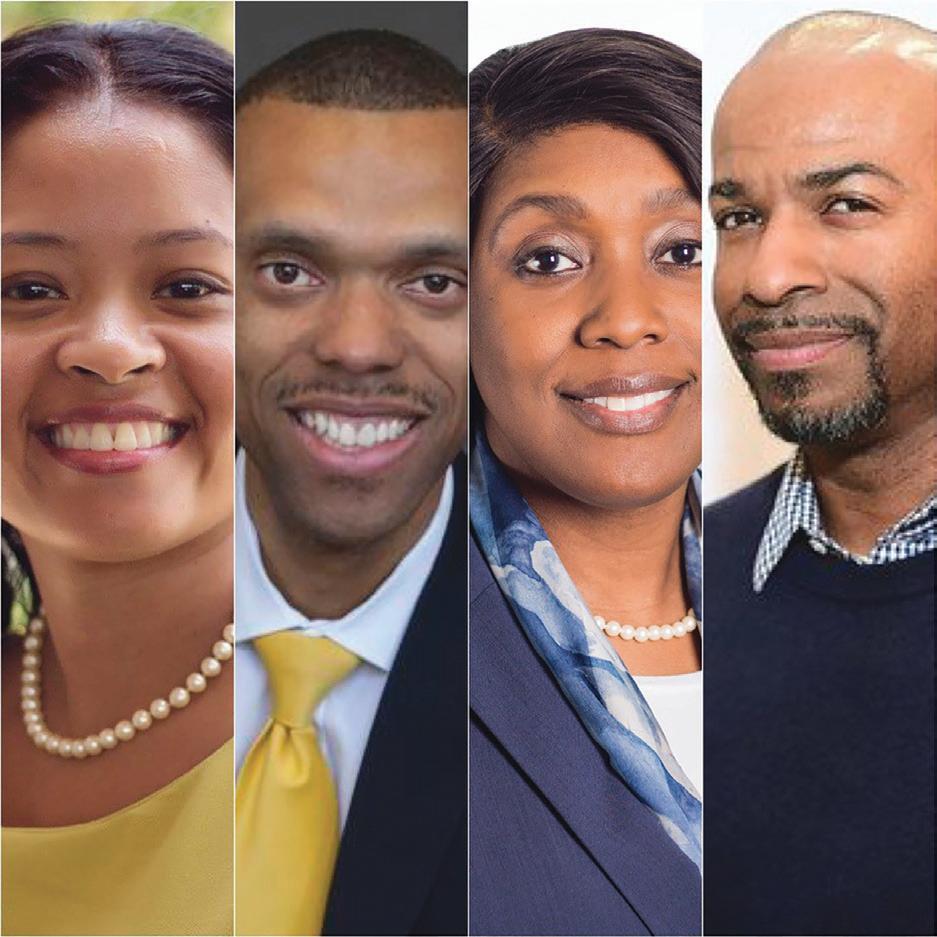
On July 27, Gov. Newsom announced the appointment of an Executive Director and seven appointees to serve on the state’s first Racial Equity Commission, which is supported by an initial state investment of $3.8 million over the next fiscal year and $3.1 million each year following, through 2030.
Created by a 2022 executive order the commission will recommend actions the state can take to “advance racial equity and address structural racism,” according to the governor’s office.
The four Black appointees are:
Larissa Estes of Walnut Creek has been appointed Executive Director of the Racial Equity Commission. Dr. Estes has been Director of ALL IN Alameda County since 2019.
Commission member Yolanda R. Richardson of Roseville is Chief Executive Officer of the San Francisco Health Plan. Before that, Richardson was Secretary of the California Government Operations Agency.
Commission member Traco Matthews of Bakersfield is Chief Health Equity Officer at Kern Health Systems.
Commission member Simboa Wright of Fontana is Vice President of SEIU Local 721 labor union.
“I’m proud to appoint these diverse leaders to advise our ongoing work to ensure that all our communities have a fair shot at achieving the California dream,” said Newsom. Other appointees are Virginia Hedrick of Carmichael; Gabriel Maldonado of Los Angeles; Julie Onodera of Sacramento; and Manuel Pastor of Pasadena.
Blacks and Latinos Account for Nearly 80% of Arrests in Los Angeles
Blacks and Latinos make up about 56% of Los Angeles’ population, but they account for about 80% of all arrests in California’s largest city, according to an analysis of about 300,000 arrests between 2019 and 2022 conducted by L.A. Controller Keith Meija’s office.
According to the report released last week, for almost every year of the study, Council District 14 led all other districts for the total number of arrests. In 2021, it came in second to Council District 8 by a difference of only three arrests.
Lawmakers Spar Over $5 Billion Bond to Fight Fentanyl California Democrats and Republicans are at loggerheads over approaches to combat the state’s growing fentanyl crisis. New bi-partisan proposed legislation aims to bridge the ideological and tactical gap between the two parties.
Assembly Public Safety Committee Chair Reggie Jones-Sawyer (D-Los Angeles) and Assembly Public Safety Committee Vice Chair Juan Alanis (R-Modesto) coauthored Assembly Bill AB1510, which would allocate $2 billion for Substance Use Disorder treatment and $400 million for harm reduction programs. Another $200
million would go to preventing overdoses. The bond would also provide $2 billion to expand programs that teach young people about recreational drug use risks.
Jones-Sawyer has called the bond act a comprehensive approach instead of a “bill by bill” approach to combating the crisis.
However, some Republicans believe that the proposal would take too long to be implemented and immediate action is necessary.
“We’re asked to watch the long game,” Assemblymember Diane Dixon (R-Newport Beach) Dixon told the Sacramento Bee. “So. I’m interested in seeing the benefits and accountability of a long game. But right now, we have a fentanyl crisis here today.”
Once AB 1510 passes in the Legislature and is signed by Gov. Newsom it will go before voters as a ballot measure during the March 2024 primary and November 2024 elections.
Under Pressure to Resign, Alameda County’s First Black Woman D.A. Fires Back at NAACP
Concerned by a sharp rise in crimes, the Oakland branch of the NAACP is blaming Alameda County District Attorney Pamela Price for “failed leadership.”
Price, the first Black female District Attorney in the history of Alameda County, is the target of a recall effort staged by groups that say the city is in the grip of a “public safety crisis,” according to Oakland NAACP branch president Cynthia Adams and Acts Full Gospel Church’s Bishop Bob Jackson stated.
“Oakland residents are sick and tired of our intolerable public safety crisis that overwhelmingly impacts minority communities. Murders, shootings, violent armed
robberies, home invasions, car break-ins, sideshows, and highway shootouts have become a pervasive fixture of life

Families
California Attorney General Rob Bonta joined a bipartisan coalition of 24 state attorneys general in submitting a letter to Congress in support of H.R. 1255, the “Sgt. Isaac Woodard, Jr. and Sgt. Joseph H. Maddox GI Bill Restoration Act of 2023.’
The bill was named after two Black World War II veterans who were denied benefits under the GI Bill.
Authored by Congressmembers Seth Moulton (DMA-6) and James Clyburn (D-SC-6), the legislation would extend eligibility for certain housing and educational benefits to Black World War II veterans and their families.
“Exactly 75 years ago, President Harry S. Truman mandated the desegregation of our Armed Forces. Today, we cannot lose sight of a harsh reality: Black World War II veterans and their families were systematically denied the GI benefits they had rightfully earned,” said Bonta. “H.R. 1255 would fix that terrible injustice.”
in Oakland,” Adams and Jackson stated in a letter to city residents urging them to demand improved public safety in their communities.
“African Americans are disproportionately hit the hardest by crime in East Oakland and other parts of the city. But residents from all parts of the city report that they do not feel safe. Everyone is in danger,” the letter continued.
Price’s office released a statement pushing back on claims made by Adam and Jackson in the letter.
“We are disappointed that a great African American pastor and a great African American organization would take a false narrative on such an important matter. We would expect more from Bishop Bob Jackson and the Oakland Chapter of the NAACP,” said a spokesperson from the District Attorney’s office.
Calif. Dept of Finance Releases June “Finance Bulletin Report”
Last week, the California Department of Finance released its July edition of the Finance Bulletin Report. The bulletin recaps economic changes during the previous month. California’s unemployment rate rose to 4.6 % in June. The labor force increased by 13,600 while civilian household employment rose by 7,900, and the number of unemployed workers increased by 5,700.
California added 11,600 nonfarm payroll jobs, driven by gains in private education and health services (7,000), leisure and hospitality (6,800) and construction (6,000). The largest job loss was in trade, transportation, and utilities (-7,600).
California’s personal income increased by 0.7% (SAAR) in the first quarter of 2023. Gains were driven by increases in wages and salaries and property income, offsetting declines in transfer payments.
“While June is historically an important month for personal income and corporation tax, cash results from these two revenue sources -- with the exception of withholding -- are not reliable due to this year’s delayed tax deadlines,” stated the report.
Attorney Gen. Robert Bonta Announces Support for Federal Bill Benefitting Black WWII Veterans and Their
If passed, H.R. 1255 would also extend access to the VA Loan Guaranty Program to surviving spouses and certain direct descendants of Black World War II veterans and to the Post-911 GI Bill educational assistance benefits to surviving spouses and certain direct descendants of Black World War II veterans.
Additionally, it would establish a panel of experts to make recommendations on addressing inequitable access to benefits for female and minority members of the Armed Forces.
Measure Expanding Local Gov’t Power to Enact Rent Control Makes It on November Ballot
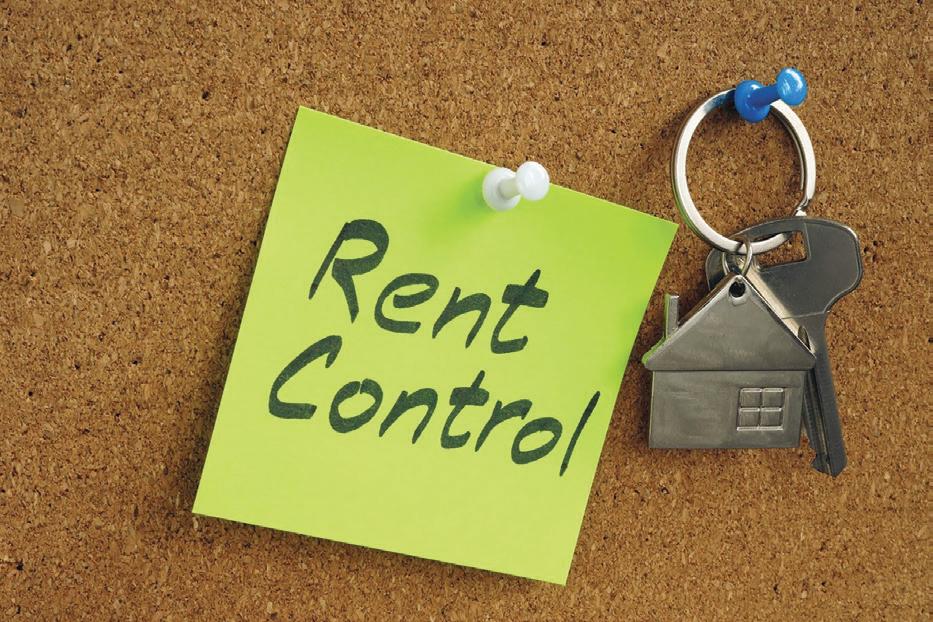
On July 26, California Secretary of State Shirley N. Weber announced that initiative 1942 became eligible for the November 5, 2024, general election ballot. The initiative would expand local government’s authority to enact rent control on residential property.
Current state law (the Costa-Hawkins Rental Housing Act of 1995) generally prevents cities and counties from limiting the initial rental rate that landlords may charge to new tenants in all types of housing. It also prevents cities from limiting rent increases for existing tenants in, residential properties that were first occupied after February 1, 1995, single-family homes and condominiums.

Free Resources for BC And CSUB Students
 By Dana Carrillo
By Dana Carrillo
South Kern Sol
California State University (CSUB) of Bakersfield and Bakersfield College (BC) are two of the more well-known higher education institutions that offer Associate’s and Bachelor’s degrees plus support for transferring students.
Some resources students can utilize from both campuses are highlighted below.

BC continues to add modern updates with the intention of investing in its students. Many changes include access to new technologies including a fully online bookstore where students can order physical or ebooks 24/7. Pick-up for bookstore orders will be available in the same location as the old store, and students are encouraged to bring used books back for cash.
Since 2015 BC students can enroll in four-year programs like the Bachelor’s Degree in Industrial Automation (INDA). Graduates can pick from a variety of industries like Energy, Logistics, and Food according to BC’s website. There are three levels of completion: certification, associate’s degree, and bachelor’s degree.
Other services BC offers its students is free access to basic needs like food through their Renegade food pantry. Although it’s just for students, it offers a robust selection of clothes, drinks, and fresh products like produce. During the summer students can utilize the space for groceries or help signing up for government assistance like SNAP.
On the third Thursday of every month, the Renegade Pantry hosts a farmers market. Due to Covid-19 related provisions, many students felt the expansion of their benefits for food and other necessary. However, because these additional benefits were due to the pandemic it is now being threatened by reductions.
Caitlyn Davidson, the BC Basic Needs program manager spoke to news outlets about how the pandemic and loss of benefits has been affecting traffic in the campus food pantry.
“Not as many students are on campus during the summertime, but this year our pantry has consistently stayed busy. Before we would see maybe a few hundred people a week. Right now, we’re consistently seeing between five to six hundred people per week,” Davidson stated.
Future college students or current students can reach out to their campuses’ Extended Opportunity Programs and Services (EOPS) for assistance with child care, academics, and registration for classes, and they provide general support to help guide you through your college experience.
For both BC and CSUB, there will be a significant change in financial aid opportunities for California foster youth and current students who were formerly in foster care. State Senate Bill (SB) 307, if passed, will expand the Middle Class Scholarship that is available through financial aid and it will include a way to apply for fee waivers to have 100% of tuition paid for.
During the summer CSUB has resources open and ready for use by students and the community.

Community members are encouraged and needed to volunteer to sustain the edible garden. Interested students or residents can directly contact the edible garden at csub.edu/basicneeds. This website will show an array of links to resources including the campus food pantry, Cal Fresh benefits and assistance applications, and updated information for food distribution days.
Similar to the community college, CSUB offers a food pantry that is open to its students Monday through Thursday this week, and they provide updates to schedules and hours on the CSUB website. On their site they provide a list of food items the community can donate. Students can utilize this service by adhering to their point system which is explained online, and the pantry is located next to the Student Union closest to the parking lot.

